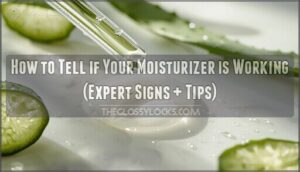This site is supported by our readers. We may earn a commission, at no cost to you, if you purchase through links.

Start with lukewarm water and a cream-based cleanser that won’t strip your skin’s natural oils.
Apply moisturizer while your skin’s still damp to lock in hydration—look for ingredients like hyaluronic acid, ceramides, and glycerin.
Don’t forget sunscreen daily, as UV damage worsens dryness.
Your nighttime routine should include a heavier moisturizer or facial oil.
The secret lies in understanding whether you’re dealing with dehydrated skin or truly dry skin, as each requires different approaches.
Table Of Contents
- Key Takeaways
- Dry Skin Causes
- Hydrate Dry Skin Effectively
- Skincare Routine Essentials
- Hydrating Ingredients and Tips
- Long-Term Skin Health Strategies
- Frequently Asked Questions (FAQs)
- How do I hydrate my extremely dry skin?
- What is my body lacking when my skin is dry?
- What’s the fastest way to rehydrate your skin?
- Can dry skin cause a rash?
- How do you rehydrate severely dry skin?
- How can I hydrate my skin naturally?
- How can I hydrate my skin ASAP?
- What deeply hydrates skin?
- What causes skin to become dehydrated?
- How can environmental factors affect skin hydration?
- Conclusion
Key Takeaways
- Apply moisturizer to damp skin – You’ll lock in up to 60% more hydration when you layer hyaluronic acid serums and ceramide-rich moisturizers on slightly wet skin rather than completely dry skin.
- Choose the right cleansing approach – You should use lukewarm water and cream-based cleansers that won’t strip your skin’s natural oils, avoiding harsh soaps that compromise your protective barrier.
- Understand dehydrated vs. dry skin – You need to identify whether you’re lacking water (dehydrated) or oil (dry skin) since each condition requires different treatment approaches and product selections.
- Maintain consistent daily protection – You must use broad-spectrum SPF 30+ sunscreen daily and establish a routine with gentle exfoliation 1-2 times weekly to prevent further moisture loss and barrier damage.
Dry Skin Causes
You might think all skin dryness is the same, but there’s actually a key difference between dehydrated and dry skin that affects how you should treat it.
Understanding what’s causing your skin issues helps you choose the right approach to restore that healthy, comfortable feeling you’re after.
Dehydrated Skin Vs Dry Skin
While many people think dry skin and dehydrated skin are the same thing, they’re actually different conditions requiring distinct approaches.
Understanding the difference between water vs. oil deficiency helps you choose the right products for your skin’s underlying causes.
- Dry skin lacks oil production from sebaceous glands, creating a genetic skin type
- Dehydrated skin lacks water content and can affect any skin type, even oily
- Environmental factors like heating and air conditioning worsen both conditions
- Simultaneous conditions can occur when your skin barrier becomes compromised
Signs of Dehydrated Skin
Dehydrated skin sends clear warning signals that your moisture barrier needs attention.
Your skin’s moisture barrier is crying out for help—listen to what it’s telling you.
Your skin might feel tight after washing, appear dull despite your skincare routine, or show fine lines more prominently than usual.
| Physical Signs | Visual Indicators |
|---|---|
| Rough skin texture and flakiness | Dull, lackluster appearance |
| Sensitive skin with increased irritation | Dark, sunken under-eye bags |
| Tightness and itching sensations | Loss elasticity when pinched |
| Excess sebum production paradoxically | More pronounced wrinkles |
Dehydrated skin often triggers your body’s defense mechanism, producing more oil to compensate for water loss, which can lead to unexpected breakouts even on typically dry skin.
Skin Barrier Function
Your skin barrier function works like a protective wall, keeping moisture in and irritants out.
Your skin’s defense system determines whether you stay comfortable or constantly battle irritation and moisture loss.
When this barrier gets compromised by environmental stressors, you’ll notice increased TEWL regulation issues and disrupted lipid composition. One factor can be harsh soaps and cleansers.
Here’s how barrier repair works:
- Ceramides for skin rebuild the protective lipid layers
- Microbiome influence maintains healthy bacterial balance
- Dry skin hydration improves through targeted moisturizers
- Skin hydration increases when barrier function strengthens
Hydrate Dry Skin Effectively
Understanding the difference between oil vs. water deficiency helps you target your skin’s specific needs more effectively.
Your skin might be thirsty for water even if it produces adequate oil, or it could lack both elements simultaneously due to genetic predisposition or environmental factors.
The tenting test offers a quick assessment: pinch your skin gently, and if it stays raised briefly, you’re dealing with dehydration. However, don’t rely solely on self-diagnosis when selecting dry skin remedies.
Effective dry skin hydration requires layering products strategically. Apply serums with hyaluronic acid to damp skin, allowing better product absorption into deeper layers.
Follow with moisturizers containing ceramides and fatty acids to lock in hydration.
Many find that hyaluronic acid deeply hydrates the skin.
Overnight masks provide intensive treatment while you sleep, delivering concentrated ingredients when your skin’s repair mechanisms are most active.
These targeted skin hydration tips work best when you understand your skin’s unique requirements rather than following generic advice.
Skincare Routine Essentials
Building an effective skincare routine for dry skin requires the right products applied in the correct order to maximize hydration benefits.
You’ll need to focus on four key elements: gentle cleansing, proper moisturizing, sun protection, and strategic exfoliation to restore your skin’s natural barrier function.
This approach will help ensure that your skin receives the care it needs to stay healthy and hydrated.
Gentle Cleansers and Exfoliants
Your cleanser ingredients matter more than you think. Choose cream or oil-based formulas that won’t strip your skin’s natural oils.
Gentle cleanser options like micellar water effectively remove makeup without harsh chemicals that create micro-cuts.
For exfoliation frequency, stick to once or twice weekly using chemical exfoliants like lactic acid over physical scrubs.
Double-cleansing guarantees thorough removal while preserving hydrating ingredients.
Using a gentle skin product is vital for maintaining healthy skin.
Moisturizers and Humectants
After cleansing, you’ll want to lock in moisture with the right products.
Choose moisturizers containing hyaluronic acid, which holds 1,000 times its weight in water.
Humectant benefits include drawing moisture from deeper skin layers and the environment.
Look for ceramide products that repair your skin barrier while glycerin and sodium PCA provide lightweight hydration for your skin hydration routine.
Understanding skin care humectants is essential for effective dry skin management.
Sunscreen and Broad-Spectrum Protection
Daily broad-spectrum SPF 30+ sunscreen acts as your skin’s protective shield, preventing UV damage that worsens dryness.
Choose moisturizing sunscreens with zinc oxide or titanium dioxide for dual protection and hydration. These mineral formulas create a barrier against harmful rays while locking moisture into your skin barrier, supporting your hydration efforts year-round.
Understanding your skincare routine is essential for effective dry skin management and prevention, and using broad-spectrum sunscreen with mineral formulas is crucial.
Weekly Exfoliation and Masking
Among the weekly rituals that transform your skin, exfoliation and masking work like a one-two punch for hydration.
Chemical exfoliants with lactic acid gently remove dead cells while providing moisture retention benefits.
Follow with hydrating masks containing hyaluronic acid for a 21% hydration boost.
This combination enhances your moisturizer’s absorption, supporting long-term skin renewal and facial steaming-like results.
Using the right exfoliating products is essential for effective skin renewal and hydration.
Hydrating Ingredients and Tips
Mastering the right hydrating ingredients transforms your skin care game completely. Hyaluronic Acid stands out as the superstar humectant, holding up to 1,000 times its weight in water to plump your skin naturally.
When selecting hydrating serums, look for this powerhouse ingredient alongside glycerin for maximum moisture retention.
Here are four game-changing moisturizer tips for maximum hydration:
- Layer lightweight serums before heavier creams – This allows deeper penetration of active ingredients into your skin barrier
- Apply products to damp skin – This simple trick increases water retention by up to 60% compared to dry application
- Use facial sprays throughout the day – Thermal water sprays provide instant hydration while supporting your skin’s microbiome
- Choose ceramide-rich formulas – Ceramide benefits include restoring your skin barrier and preventing water loss
Pat products gently into your skin rather than rubbing to reduce irritation and improve absorption. This methodical approach guarantees every drop of your moisturizer works harder to hydrate dry skin effectively.
Long-Term Skin Health Strategies
While effective hydration techniques provide immediate relief, maintaining healthy skin requires a long-term approach that goes beyond daily skincare routines.
You’ll achieve the best results by combining professional guidance with consistent lifestyle habits that support your skin’s natural barrier function over time, which is crucial for healthy skin.
Consulting a Dermatologist
When persistent skin dryness causes don’t respond to over-the-counter treatments, scheduling a dermatologist visit becomes essential.
These medical professionals conduct thorough skin analysis to identify underlying conditions like eczema or hormonal imbalances.
Dermatologists provide personalized advice and treatment options, including prescription moisturizers or medical guidance that addresses your specific skin dryness causes effectively.
Avoiding Self-Diagnosis
Self-diagnosis often misses dry skin’s root causes, creating a cycle of ineffective treatments.
Without Professional Guidance, you might mistake dehydrated skin for naturally dry skin, leading to unsuitable products that worsen irritation.
- Misdiagnosis Risks: Confusing skin conditions delays proper treatment
- Dermatologist Consult: Expert Advice identifies underlying issues accurately
- Skin Analysis: Professional assessment prevents costly skincare mistakes
Prioritizing Healthy Lifestyle Habits
Wellness becomes your skin’s best friend when you embrace lifestyle changes that support hydration from within.
Your daily habits directly impact skin moisture balance, making healthy choices essential for combating dry skin effectively.
| Healthy Habit | Skin Health Benefit |
|---|---|
| Balanced Diet | Provides omega-3s and antioxidants for barrier function |
| Healthy Sleep | Allows cellular repair and moisture retention |
| Regular Exercise | Boosts circulation and nutrient delivery |
| Stress Management | Reduces cortisol that breaks down collagen |
| Hydration Tips | Maintains ideal water content in skin cells |
Nurturing Skin Health on Ongoing Basis
Building on healthy habits, you’ll want to treat skin care like brushing your teeth—consistent, not just occasional.
Daily routines with moisturizing and hydration techniques matter, but don’t forget preventive measures like sunscreen and gentle cleansers.
Think of skin nutrition as feeding your skin, not just your stomach, which supports lasting skin health and hydration through ongoing care that keeps dry skin at bay.
By incorporating effective skin nourishment techniques into your daily routine, you can achieve ideal skin health.
Frequently Asked Questions (FAQs)
How do I hydrate my extremely dry skin?
Use gentle cleansers, apply hyaluronic acid serums on damp skin, follow with ceramide-rich moisturizers, and drink plenty of water. Consider overnight masks for intensive repair.
What is my body lacking when my skin is dry?
Your dry skin typically lacks water and natural oils.
When your skin barrier is compromised, you’re missing essential fatty acids, ceramides, and adequate hydration from both internal water intake and external moisturizing products.
What’s the fastest way to rehydrate your skin?
Apply a hydrating serum with hyaluronic acid to damp skin, then immediately seal it with a rich moisturizer containing ceramides or squalane for maximum absorption.
Can dry skin cause a rash?
Yes, dry skin can definitely cause a rash. When your skin barrier becomes compromised from dryness, it’s more vulnerable to irritation, inflammation, and redness that manifests as rash-like symptoms.
How do you rehydrate severely dry skin?
Hyaluronic acid holds 1,000 times its weight in water, making it your skin’s hydration hero.
Start with gentle cleansing, apply hyaluronic acid serum to damp skin, follow with ceramide moisturizer, and seal everything with occlusive like petrolatum overnight.
How can I hydrate my skin naturally?
You’ll nourish skin naturally by drinking plenty of water, eating omega-3 rich foods, using gentle cleansers, applying natural oils like jojoba, and maintaining humidity in your environment.
How can I hydrate my skin ASAP?
Start with a hydrating serum containing hyaluronic acid on damp skin, then immediately apply a rich moisturizer with ceramides. Use a humidifier and drink water consistently throughout the day.
What deeply hydrates skin?
Hyaluronic acid holds 1,000 times its weight in water, making it skin’s ultimate moisture magnet.
You’ll find deep hydration through ceramides, glycerin, and squalane—ingredients that penetrate barriers and lock moisture in effectively.
What causes skin to become dehydrated?
External factors compromise your skin’s protective barrier, allowing moisture to escape.
Hot water, harsh cleansers, environmental conditions like dry air, over-exfoliation, and lifestyle choices including alcohol consumption strip away natural oils and water, which can be considered as external factors.
How can environmental factors affect skin hydration?
Low humidity strips moisture from your skin’s surface, while hot showers and harsh cleansers damage your protective barrier.
Cold weather, air conditioning, and wind accelerate water loss, leaving skin tight and flaky.
Conclusion
Remember how your skin feels after a long, hot shower—tight, flaky, and uncomfortable? That’s exactly what happens when you don’t know how to hydrate dry skin properly.
By implementing these evidence-based strategies consistently, you’ll notice significant improvements within weeks. Focus on gentle cleansing, strategic moisturizing with proven ingredients, and daily sun protection.
Your skin’s barrier function will strengthen, reducing moisture loss and irritation. Consistency matters more than expensive products—stick to these fundamentals for lasting hydration.
- https://pmc.ncbi.nlm.nih.gov/articles/PMC5849435/
- https://remedyskin.com/blogs/skinpedia-ingredients/humectants-emollients-and-occlusives
- https://www.centerforsurgicaldermatology.com/blog/what-makes-the-best-moisturizers-for-dry-skin
- https://jddonline.com/articles/a-randomized-controlled-clinical-study-to-evaluate-the-effectiveness-of-an-active-moisturizing-lotion-with-colloidal-oatmeal-skin-protectant-versus-its-vehicle-for-the-relief-S1545961614P1265X
- https://www.letsmakebeauty.com/blog/post/best-and-worst-ingredients-in-moisturizers-what-every-formulator-should-know-for-dry-oily-and-sensit





